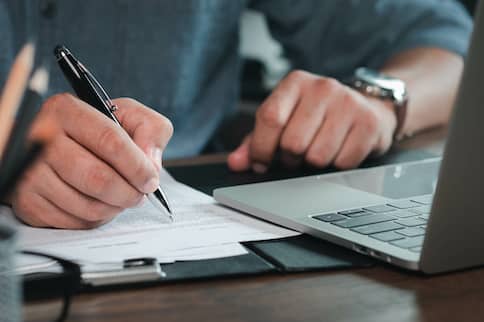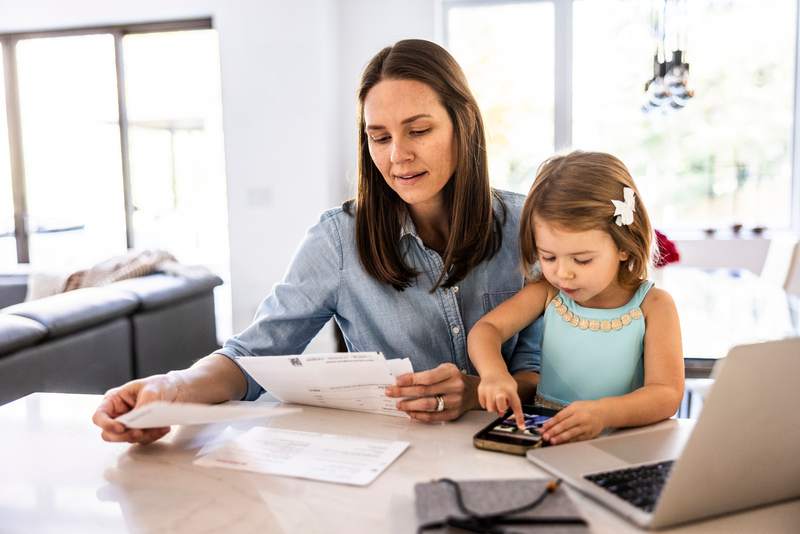If you’re carrying debt, you’re in good company. As of the third quarter of 2024, the average U.S. household had $105,056 in debt, according to Experian. That number accounts for various types of debt, including mortgages, student loans, auto loans and credit cards.
Even though the cost of living is still high due to inflation, and interest rates are currently high as well, there are steps you can take to get out of debt faster. The sooner you get rid of debt, the more money you can save on interest.
Common Types Of Debt
Debt, in its most basic form, is borrowed money. It could result from purchasing a house or car, financing higher education or even buying clothing.
Debt isn’t always bad. A mortgage, for example, helps you buy a home, which is an asset that can gain value over time. And if you pay your debt on time, it can help you build a credit history, leading to a better credit score.
If your goal is to get out of debt fast, it’s important to understand common types of debt and the benefits of eliminating them quickly.
What’s Your Goal?
Buy A Home
Discover mortgage options that fit your unique financial needs.

Refinance
Refinance your mortgage to have more money for what matters.
Tap Into Equity
Use your home’s equity and unlock cash to achieve your goals.
Credit Card Debt
As of the third quarter of 2024, the average consumer credit card balance was $6,730, according to Experian. Credit card debt is revolving debt. You get a line of credit, and as you borrow money and repay it, that credit line refreshes.
The nice thing about credit cards is that you can use them to pay for just about any expense, whether it’s groceries, gas or clothing. Using your credit card regularly can help you build up your credit score and credit history, making it easier to secure more affordable loans. But if you don’t pay your credit card bills in full and make only the minimum monthly payments, you can get trapped in a dangerous cycle of debt quickly.
Not only do credit cards generally come with high interest rates, but they also typically compound interest on a daily basis. This means that for each day you carry a balance beyond its due date, you’re charged interest on your balance and interest.
Paying off credit card debt quickly could amount to a lot of savings on interest. It could also lead to an improved credit score. The reason for this is that credit utilization, or the amount of revolving credit you’re using at a particular time, is a factor in calculating your credit score. If you pay off credit card debt and it leads to a higher credit score, your next loan could be less expensive.
Student Loan Debt
Student loan debt is debt you take on to get an education, whether it’s a trade program at a community college or an advanced degree at a prestigious university. Often, people begin paying off student loan debt, with interest, once they graduate. Your repayment plan will depend on the type of student loans you have.
Federal loans have a standard repayment plan of 10 years. There are income-driven repayment plans that can result in smaller monthly payments but a longer payoff period.
As of the third quarter of 2024, the average student loan balance was $35,208, according to Experian. Paying off student loans ahead of schedule can save you money, but if you took out federal loans, you may have a competitive interest rate on that debt. It could pay to focus on higher-cost debt first, like credit cards. You should also know that if you file for bankruptcy, you may not be able to get your student debt discharged.
Real Estate Debt
Most people can’t afford to buy a home outright, so they take out a mortgage to pay it off over time. As of the third quarter of 2024, the average mortgage balance was $252,505, according to Experian.
Paying off a mortgage quickly can save you money on interest. Remember that a mortgage is designed to be paid off over a long period of time – usually 15 to 30 years. Since they typically come with lower interest rates than other types of consumer debt, it usually makes sense to focus on paying off higher-cost debt quickly.
Car Loans
As of the third quarter of 2024, the average auto loan balance was $24,297, according to Experian. Just as many people can’t pay for a home outright, they finance automobiles as well.
Auto loans are typically designed to be paid off in about five to six years. Some car loans need to be paid back sooner, such as in three years. Often, a shorter repayment period allows you to obtain a lower interest rate. Whether it pays to prioritize an auto loan over other types of debt depends on the interest rate attached to your loan.
Personal Loans
A personal loan allows you to borrow money for any purpose. As of the third quarter of 2024, the average personal loan balance was $19,014, according to Experian.
A personal loan can also be used to consolidate debt to make repayments easier. Rather than juggle three credit card balances and a car loan, for example, you could bundle all of those debts into a personal loan and make a single monthly payment instead. However, for this strategy to be effective, it’s important not to add to your debt while repaying a personal loan.
Personal loans are typically repaid in one to five years, sometimes longer. If you’re using a personal loan to consolidate debt, it can be tricky to pay it off ahead of schedule. By consolidating into a personal loan, you may be saving yourself money on interest, since personal loans tend to have lower interest rates than credit cards.
Ready To Become A Homeowner?
Get matched with a lender that can help you find the right mortgage.
7 Tips For Reducing Debt Fast
The sooner you pay off debt, the more you can save on interest. But do note that in some cases, paying off a loan ahead of schedule could mean getting hit with a prepayment penalty. It’s important to check the terms of your loan to see if this will apply to you.
If you’re wondering how to get out of debt fast, here are some tips.
1. Make A Budget
A budget helps you track your expenses and identify ways to reduce your spending. That frees up money to pay off debt. You can create a budget on paper, with a spreadsheet or using an app.
- Time: Setting up a budget can take as little as an hour, but the impact on your debt repayment can be immediate. By identifying unnecessary expenses, you could free up hundreds of dollars per month, allowing you to eliminate your debt months or even years faster.
2. Create A Plan
Figure out which debts to pay off ahead of others. Common approaches include the snowball method, where you pay off your smallest debt first, or the avalanche method, where you pay off debts in order of highest interest rate to lowest.
- Time: Creating a debt payoff plan can take as little as an hour. But it could save you hundreds or even thousands of dollars in interest.
3. Don’t Borrow More
If you’re trying to get rid of debt fast, don’t borrow more money. Even if you qualify for a new credit card or loan, it’s important not to add to your debt while you’re trying to eliminate it.
- Time: Avoiding new debt has an instant impact on your financial health. If you stop borrowing today, you could avoid adding years of extra payments and thousands of dollars in interest charges.
4. Pay More Than The Minimum Payment
Whether it’s a credit card or car loan, making more than the minimum payment can help you pay off principal balances sooner. It can also save you money on interest.
- Time: If you have a $10,000 car loan with a minimum payment of $250 per month, your payoff time is four years. By doubling your monthly payments to $500, you can pay it off in as little as two years — reducing the amount of interest you pay significantly.
5. Consider Debt Consolidation
With debt consolidation, you take on new debt to pay off existing debt. It could mean getting a personal loan to pay off credit card debt or doing a balance transfer and moving a few credit card balances onto a new card with a lower or 0% introductory interest rate.
- Time: Debt consolidation could reduce the amount of time it takes to repay your debt by making your monthly payments more affordable. If you consolidate credit card balances into a personal loan with a lower interest rate, you might pay it off in three years. If you leave those balances on your credit cards to accrue interest, repayment might take five years or more.
6. Track Your Spending
It’s important to track your spending on an ongoing basis to make sure you’re spending less than what you earn. This should allow you to keep making payments toward your debt, as well as build savings so you can avoid debt in the future. A budgeting app could make it easier to keep track of your spending.
- Time: Spending as little as 15 minutes per week reviewing your spending could save you hundreds of dollars in interest or more.
7. Be As Diligent As Possible
Getting out of debt may seem like a challenge at first. But if you stick to your budget and plan, you can work toward reducing your debt and eventually achieving your goal of becoming debt-free.
As part of this process, it helps to set ground rules for spending and be diligent about where your money goes. Also, try to avoid new debt until your current debt is paid off (the exception being a mortgage, which you may carry for the majority of your adult life).
- Time: Spending a few extra minutes to carefully consider large purchases could help you avoid taking on new debt and keep your debt-payoff efforts on track. That could, in turn, save you hundreds of dollars or more in interest.
Take The First Step To Buying A Home
Find a lender that will work with your unique financial situation.
FAQ: How To Get Out Of Debt Quickly
The Bottom Line
If you’re looking to get out of debt fast, it helps to remind yourself why you’re doing it: to save money on interest and eliminate the stress of having to make those monthly payments. It may require some sacrifice, like reducing your spending. But the savings will be more than worth it.
More From Quicken Loans:
- https://www.quickenloans.com/learn/repair-credit
- https://www.quickenloans.com/learn/buying-house-after-bankruptcy
- https://www.quickenloans.com/learn/personal-loan-uses
- https://www.quickenloans.com/learn/rolling-student-loans-into-your-mortgage
- https://www.quickenloans.com/learn/how-to-get-a-personal-loan

Ben Shapiro
Ben Shapiro is an award-winning financial analyst with nearly a decade of experience working in corporate finance in big banks, small-to-medium-size businesses, and mortgage finance. His expertise includes strategic application of macroeconomic analysis, financial data analysis, financial forecasting and strategic scenario planning. For the past four years, he has focused on the mortgage industry, applying economics to forecasting and strategic decision-making at Quicken Loans. Ben earned a bachelor’s degree in business with a minor in economics from California State University, Northridge, graduating cum laude and with honors. He also served as an officer in an allied military for five years, responsible for the welfare of 300 soldiers and eight direct reports before age 25.












